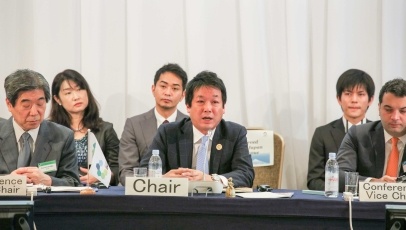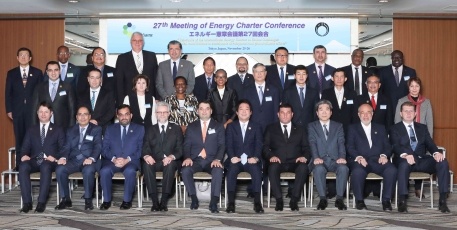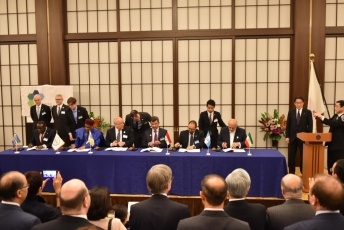Energy
The 27th Meeting of the Energy Charter Conference (Overview and Evaluation)


1. Overview

 ) Representatives from 69 countries and regions, including 32 Ministerial-level participants, among them Ministers from Georgia, Afghanistan, Iran, Jordan, Romania, Slovakia, Swaziland, Uganda, and 9 international institutions attended the meeting. (List of Ministerial-level participants (PDF)
) Representatives from 69 countries and regions, including 32 Ministerial-level participants, among them Ministers from Georgia, Afghanistan, Iran, Jordan, Romania, Slovakia, Swaziland, Uganda, and 9 international institutions attended the meeting. (List of Ministerial-level participants (PDF) ) In total, 400 people including government officials, international organizations, business circle, academic circle and diplomatic corps in Tokyo attended during the two days.
) In total, 400 people including government officials, international organizations, business circle, academic circle and diplomatic corps in Tokyo attended during the two days.
(2) Following the Statutory Session in the morning on November 25, the Ministerial Session was held on November 26 and Mr. Kentaro Sonoura, State Minister for Foreign Affairs delivered the opening remarks (English (PDF) / Japanese (PDF)
/ Japanese (PDF) ) and led the proceedings of the session as acting chair of the Energy Charter Conference. State Minister Sonoura also hosted the special lunch for Ministerial-level participants. At the Ministerial Session, participants engaged in a lively discussion on how the Energy Charter Process can address the major global energy challenges, including responding to climate change and sustainable development. The “Tokyo Declaration on the Energy Charter” (English (PDF)
) and led the proceedings of the session as acting chair of the Energy Charter Conference. State Minister Sonoura also hosted the special lunch for Ministerial-level participants. At the Ministerial Session, participants engaged in a lively discussion on how the Energy Charter Process can address the major global energy challenges, including responding to climate change and sustainable development. The “Tokyo Declaration on the Energy Charter” (English (PDF) / Japanese (PDF)
/ Japanese (PDF) ) was issued as an outcome document. Mr. Kazuo Kodama, Ambassador of Japan to the European Union, Vice-Chair of the Energy Charter Conference, chaired the Statutory Session and assisted State Minister Sonoura at the Ministerial Session.
) was issued as an outcome document. Mr. Kazuo Kodama, Ambassador of Japan to the European Union, Vice-Chair of the Energy Charter Conference, chaired the Statutory Session and assisted State Minister Sonoura at the Ministerial Session.
(3) The outreach side-event on the theme of “Global Architecture and Its Implications in Asia” will be held in the afternoon on November 25. Mr. Motome Takisawa, Parliamentary Vice Minister for Foreign Affairs of Japan attended the side-event and discussions was held on the impact and future prospects for strengthening energy security in Asia.
(4) In addition, the welcome reception hosted by Foreign Minister Kishida and the signing ceremony of the International Energy Charter was held under the patronage of Foreign Minister Kishida in the evening on November 25. The International Energy Charter is a political declaration supporting the modernization of the Energy Charter Process. The six parties, namely Iran, Guatemala, Iraq, the Economic Community of Central African States (ECCAS), the Permanent Secretariat of the Group of Five for the Sahel (G5 Sahel) and the East African Community (EAC), signed the Charter and became recognized as Observers of the Energy Charter Conference.
2. Evaluation
(1) Japan hosted the Energy Charter Conference in East Asia for the first time and invited some new Asian and African countries and organizations as an outreaching party as well as the members and observers of the Conference. With attendance of 69 countries and regions and 9 international organisations including new 9 parties, Tokyo Conference contributed to increasing the awareness the Energy Charter in the Asian and African regions and to universalizing the Energy Charter Process in these regions.
(2) During the Japanese Chairmanship, Bosnia and Herzegovina, Senegal and Rwanda signed the International Energy Charter. In addition, at the margin of Tokyo Conference, Iran, Guatemala, Iraq and three African regional organizations signed the Charter in Tokyo and Yemen has completed the accession process of the Energy Charter Treaty (ECT), which means that Japan contributed to advancing robustly the Energy Charter Process and to expanding the Process in a geographic context.
(3) As the Chair’s initiative, Japan issued the “Tokyo Declaration on the Energy Charter” based on the discussion among the members. The Tokyo Declaration affirmed that the ECT contributes to strengthening rule of law and to improving the business environment in energy field and also the importance of promoting appropriate and sustained energy investments and quality infrastructure investments are reiterated. Japan contributed greatly the discussion on roles of the Energy Charter and the way forward.
(4) Through the outreach side-event and the welcome reception, Japan encouraged understanding of the relevance and use of the ECT to the Japanese companies in order to promote oversea energy investment by these companies.
3. Programme
Friday 25 November 2016
| 14:00-16:45 | : | Outreach Side Event: “Global Energy Architecture and its Implications in Asia” |
| 14:00-14:05 | : | Opening Remarks by Mr. Motome Takisawa, Parliamentary Vice Minister for Foreign Affairs of Japan |
| 14:05-14:20 | : | Keynote Speech by Dr. Urban Rusnák, Secretary General, Energy Charter Secretariat |
| 14:20-14:35 | : | Keynote Speech by Dr. Sun Xiansheng, Secretary General, International Energy Forum |
| 14:45-15:45 | : | Session 1: Panel Discussion “How to strengthen Energy Security by better mobilizing global energy architecture while addressing climate change: Implication and Future Prospects in Asia” |
| 15:45-16:40 | : | Session 2: Panel Discussion “Global Energy Architecture for better global energy future: Challenges and Opportunities” |
| 16:40-16:45 | : | Closing remarks and closing session |
| 17:45-19:00 | : | Welcome Reception hosted by Mr. Fumio Kishida, Minister for Foreign Affairs of Japan |
| : | Signing ceremony of the International Energy Charter | |
| Remarks by Mr. Fumio Kishida, Minister for Foreign Affairs of Japan |
Saturday 26 November 2016
| 09:00-15:30 | : | Ministerial Session |
| 09:15-10:00 | : | Welcome and Opening Session |
| Opening remarks by Mr. Kentaro Sonoura, State Minister for Foreign Affairs of Japan | ||
| 10:30-11:40 | : | Plenary Session 1 “How can the Energy Charter contribute to global climate change and sustainable development including energy access?” |
| 11:40-12:00 | : | Ceremonial photography |
| 14:00-15:20 | : | Plenary Session 2 “What kind of roles the Energy Charter can play to address global energy challenges with views of Asian and African emerging countries?” |
| 15:20-15:30 | : | Closing Session |

